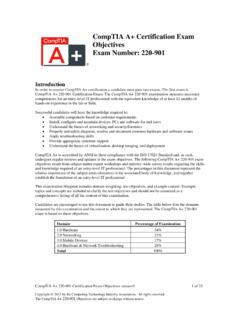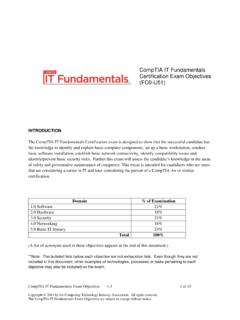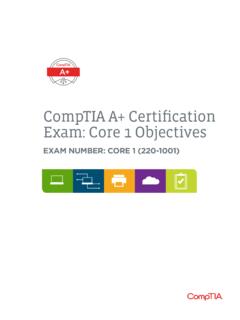Transcription of CompTIA Advanced Security Practitioner (CASP ...
1 CompTIA Advanced Security Practitioner (CASP) Certification Exam ObjectivesEXAM NUMBER: CAS-003 The CompTIA Advanced Security Practitioner (CASP) CAS-003 certification is a vendor-neutral credential. The CASP exam is an internationally targeted validation of Advanced -level Security skills and knowledge. The CASP exam will certify the successful candidate has the technical knowledge and skills required to: Conceptualize, engineer, integrate and implement secure solutions across complex environments to support a resilient enterprise Apply critical thinking and judgment across a broad spectrum of Security disciplines to propose, implement and advocate sustainable Security solutions that map to organizational strategies, balance Security requirements with business/regulatory requirements, analyze risk impact and respond to Security incidentsThe CASP certification is aimed at IT Security professionals who have.
2 A minimum of ten years of experience in IT administration, including at least five years of hands-on technical Security experience The following recommended prerequisites: CompTIA Network+, Security +, CySA+ or equivalent experienceEXAM ACCREDITATIONThe CASP certification exam is accredited by ANSI to show compliance with the ISO 17024 standard and, as such, undergoes regular reviews and updates to the exam DEVELOPMENTCompTIA exams result from subject-matter expert workshops and industry-wide survey results regarding the skills and knowledge required of an entry-level IT professional. CompTIA AUTHORIZED MATERIALS USE POLICY CompTIA Certifications, LLC is not affiliated with and does not authorize, endorse or condone utilizing any content provided by unauthorized third-party training sites (aka brain dumps ).
3 Individuals who utilize such materials in preparation for any CompTIA examination will have their certifications revoked and be suspended from future testing in accordance with the CompTIA Candidate Agreement. In an effort to more clearly communicate CompTIA s exam policies on use of unauthorized study materials, CompTIA directs all certification candidates to the CompTIA Certification Exam Policies. Please review all CompTIA policies before beginning the study process for any CompTIA exam. Candidates will be required to abide by the CompTIA Candidate Agreement. If a candidate has a question as to whether study materials are considered unauthorized (aka brain dumps ), he/she should contact CompTIA at to NOTEThe lists of examples provided in bulleted format are not exhaustive lists.
4 Other examples of technologies, processes or tasks pertaining to each objective may also be included on the exam, although not listed or covered in this objectives document. CompTIA is constantly reviewing the content of our exams and updating test questions to be sure our exams are current and the Security of the questions is protected. When necessary, we will publish updated exams based on existing exam objectives. Please know that all related exam preparation materials will still be valid.**Candidates should have basic knowledge of vendor-specific tools and technologies, as this knowledge may be required for the CASP certification exam. CompTIA has included a sample list of hardware and software at the end of this document to assist candidates as they prepare for the CASP exam.
5 This list may also be helpful for training companies that wish to create a lab component for their training the ExamCompTIA Advanced Security Practitioner (CASP) Certification Exam Objectives Version (Exam Number: CAS-003)TEST DETAILSR equired exam CAS-003 Number of questions Maximum of 90 Types of questions Multiple choice and performance-basedLength of test 165 minutesRecommended experience Ten years of experience in IT administration, including at least five years of hands-on technical Security experiencePassing score Pass/Fail only. No scaled OBJECTIVES (DOMAINS)The table below lists the domain areas measured by this examination and the approximate extent to which they are represented in the examination: CompTIA Advanced Security Practitioner (CASP) Certification Exam Objectives Version (Exam Number.)
6 CAS-003)DOMAIN PERCENTAGE OF Risk Management 19% Enterprise Security Architecture 25% Enterprise Security Operations 20% Technical Integration of Enterprise Security 23% Research, Development and Collaboration 13%Total 100% Risk management of new products, new technologies and user behaviors New or changing business models/strategies - Partnerships - Outsourcing - Cloud - Acquisition/merger divestiture/demerger - Data ownership - Data reclassification Security concerns of integrating diverse industries - Rules - Policies - Regulations - Export controls - Legal requirements - Geography - Data sovereignty - Jurisdictions Internal and external influences - Competitors - Auditors/audit findings - Regulatory entities - Internal and external client requirements - Top-level management Impact of de-perimeterization ( , constantly changing network boundary)
7 - Telecommuting - Cloud - Mobile - BYOD - Outsourcing - Ensuring third-party providers have requisite levels of information Security Policy and process life cycle management - New business - New technologies - Environmental changes - Regulatory requirements - Emerging risks Support legal compliance and advocacy by partnering with human resources, legal, management and other entities Understand common business documents to support Security - Risk assessment (RA) - Business impact analysis (BIA) - Interoperability agreement (IA) - Interconnection Security agreement (ISA) - Memorandum of understanding (MOU) - Service-level agreement (SLA) - Operating-level agreement (OLA) - Non-disclosure agreement (NDA) - Business partnership agreement (BPA) - Master service agreement (MSA) Research Security requirements for contracts - Request for proposal (RFP) - Request for quote (RFQ) - Request for information (RFI)
8 Understand general privacy principles for sensitive information Support the development of policies containing standard Security practices - Separation of duties - Job rotation - Mandatory vacation - Least privilege - Incident response - Forensic tasks - Employment and termination procedures - Continuous monitoring - Training and awareness for users - Auditing requirements and frequency - Information Risk ManagementSummarize business and industry influences and associated Security and contrast Security , privacy policies and procedures based on organizational Advanced Security Practitioner (CASP) Certification Exam Objectives Version (Exam Number: CAS-003) Categorize data types by impact levels based on CIA Incorporate stakeholder input into CIA impact-level decisions Determine minimum-required Security controls based on aggregate score Select and implement controls based on CIA requirements and organizational policies Extreme scenario planning/ worst-case scenario Conduct system-specific risk analysis Make risk determination based upon known metrics - Magnitude of impact based on ALE and SLE - Likelihood of threat - Motivation - Source - ARO - Trend analysis - Return on investment (ROI)
9 - Total cost of ownership Translate technical risks in business terms Recommend which strategy should be applied based on risk appetite - Avoid - Transfer - Mitigate - Accept Risk management processes - Exemptions - Deterrence - Inherent - Residual Continuous improvement/monitoring Business continuity planning - RTO - RPO - MTTR - MTBF IT governance - Adherence to risk management frameworks Enterprise resilience Review effectiveness of existing Security controls - Gap analysis - Lessons learned - After-action reports Reverse engineer/deconstruct existing solutions Creation, collection and analysis of metrics - KPIs - KRIs Prototype and test multiple solutions Create benchmarks and compare to baselines Analyze and interpret trend data to anticipate cyber defense needs Analyze Security solution metrics and attributes to ensure they meet business needs - Performance - Latency - Scalability - Capability - Usability - Maintainability - Availability - Recoverability - ROI - TCO Use judgment to solve problems where the most secure solution is not feasibleGiven a scenario, execute risk mitigation strategies and risk metric scenarios to secure the Risk ManagementCompTIA Advanced Security Practitioner (CASP) Certification Exam Objectives Version (Exam Number.)
10 CAS-003) Physical and virtual network and Security devices - UTM - IDS/IPS - NIDS/NIPS - INE - NAC - SIEM - Switch - Firewall - Wireless controller - Router - Proxy - Load balancer - HSM - MicroSD HSM Application and protocol-aware technologies - WAF - Firewall - Passive vulnerability scanners - DAM Advanced network design (wired/wireless) - Remote access - VPN - IPSec - SSL/TLS - SSH - RDP - VNC - VDI - Reverse proxy - IPv4 and IPv6 transitional technologies - Network authentication methods - - Mesh networks - Placement of fixed/mobile devices - Placement of hardware and applications Complex network Security solutions for data flow - DLP - Deep packet inspection - Data flow enforcement - Network flow (S/flow)










